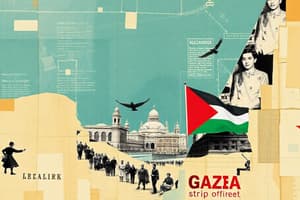Podcast
Questions and Answers
Which countries border Israel?
Which countries border Israel?
Israel is bordered by Lebanon to the north, Syria to the northeast, Jordan to the east, and Egypt to the southwest.
What is the approximate population of Israel and its major demographic groups?
What is the approximate population of Israel and its major demographic groups?
Israel has approximately 9 million people, with about 74% Jewish, 21% Arab, and others.
When was Israel established and what was the reason behind its formation?
When was Israel established and what was the reason behind its formation?
Israel was established in 1948 following the end of the British Mandate for Palestine, based on the United Nations Partition Plan of 1947.
Describe the structure of Israel's government.
Describe the structure of Israel's government.
What are the key sectors of Israel's economy?
What are the key sectors of Israel's economy?
Identify major religions practiced in Israel and a few significant religious sites.
Identify major religions practiced in Israel and a few significant religious sites.
What are some key events in the Israeli-Palestinian conflict?
What are some key events in the Israeli-Palestinian conflict?
What were the Camp David Accords and the Oslo Accords?
What were the Camp David Accords and the Oslo Accords?
What current issues does Israel face today?
What current issues does Israel face today?
What influences shape Israeli culture?
What influences shape Israeli culture?
Flashcards
Israel's Establishment Year
Israel's Establishment Year
Israel was established in 1948 after the British Mandate ended.
Israel's Capital
Israel's Capital
Jerusalem is the capital city of Israel.
Israel's Major Religions
Israel's Major Religions
Judaism, Islam, and Christianity are major religions in Israel.
Israel's Knesset
Israel's Knesset
Signup and view all the flashcards
Israel's Economy
Israel's Economy
Signup and view all the flashcards
Arab-Israeli Wars
Arab-Israeli Wars
Signup and view all the flashcards
Israeli-Palestinian Conflict
Israeli-Palestinian Conflict
Signup and view all the flashcards
Camp David Accords
Camp David Accords
Signup and view all the flashcards
UN Partition Plan
UN Partition Plan
Signup and view all the flashcards
Start-Up Nation
Start-Up Nation
Signup and view all the flashcards
Study Notes
Geography
- Located in the Middle East, bordered by Lebanon (north), Syria (northeast), Jordan (east), and Egypt (southwest).
- Mediterranean Sea to the west.
- Major cities: Jerusalem (capital), Tel Aviv, Haifa, and Beersheba.
Population
- Approximately 9 million people.
- Diverse demographics including Jewish (approx. 74%), Arab (approx. 21%), and others.
- Languages: Hebrew (official), Arabic (official).
History
- Established in 1948 following the end of the British Mandate for Palestine.
- Formation based on the United Nations Partition Plan of 1947.
- Significant conflicts: Arab-Israeli Wars (1948, 1967, 1973), ongoing Israeli-Palestinian conflict.
Government
- Parliamentary democracy with a multi-party system.
- Knesset is the legislative body.
- President serves primarily as a ceremonial figure; Prime Minister is the head of government.
Economy
- Diverse economy with technology, agriculture, and tourism as key sectors.
- Known for a high-tech industry (Start-Up Nation).
- Notable exports: diamonds, machinery, and pharmaceuticals.
Culture
- Influenced by Jewish, Christian, and Muslim traditions.
- Diverse festivals: Passover, Yom Kippur, Christmas, Ramadan.
- Rich culinary scene featuring Mediterranean, Middle Eastern, and various ethnic cuisines.
Religion
- Major religions: Judaism (dominant), Islam, Christianity.
- Significant sites: Western Wall, Dome of the Rock, Church of the Holy Sepulcher.
Conflicts and Peace Efforts
- Long-standing Israeli-Palestinian conflict over territory and statehood.
- Peace treaties: Camp David Accords (1978) with Egypt, Oslo Accords (1993) aimed at peace with Palestinians.
- Ongoing tensions surrounding settlements, borders, and the status of Jerusalem.
Current Issues
- Security concerns due to regional instability and terrorism.
- Social issues: integration of Arab citizens, economic disparity, and political divisions.
- Recent normalization of relations with several Arab states (e.g., UAE, Bahrain) through the Abraham Accords.
Geography
- Located in the Middle East, bordered by Lebanon, Syria, Jordan, and Egypt.
- Has a Mediterranean coastline to the west.
- Major cities include Jerusalem (capital), Tel Aviv, Haifa, and Beersheba.
Population
- Approximately 9 million people.
- Diverse demographics including Jewish (approx. 74%), Arab (approx. 21%), and other groups.
- Official languages are Hebrew and Arabic.
History
- Established in 1948, following the end of the British Mandate for Palestine.
- Formed based on the United Nations Partition Plan of 1947.
- Notable conflicts include the Arab-Israeli Wars (1948, 1967, 1973) and the ongoing Israeli-Palestinian conflict.
Government
- Parliamentary democracy with a multi-party system.
- Knesset is the legislative body.
- President serves as a ceremonial figure; Prime Minister is the head of government.
Economy
- Diverse economy with key sectors in technology, agriculture, and tourism.
- Known for its high-tech industry, often referred to as the "Start-Up Nation".
- Notable exports include diamonds, machinery, and pharmaceuticals.
Culture
- Influenced by Jewish, Christian, and Muslim traditions.
- Celebrates diverse festivals such as Passover, Yom Kippur, Christmas, and Ramadan.
- Renowned for its rich culinary scene, incorporating Mediterranean, Middle Eastern, and various ethnic cuisines.
Religion
- Major religions include Judaism (dominant), Islam, and Christianity.
- Significant religious sites include the Western Wall, Dome of the Rock, and Church of the Holy Sepulcher.
Conflicts and Peace Efforts
- Characterized by the long-standing Israeli-Palestinian conflict over territory and statehood.
- Peace treaties include the Camp David Accords (1978) with Egypt and the Oslo Accords (1993) intended for peace with Palestinians.
- Ongoing tensions persist around settlements, borders, and the status of Jerusalem.
Current Issues
- Security concerns persist due to regional instability and terrorism.
- Social issues include integration of Arab citizens, economic disparity, and political divisions.
- Recent normalization of relations with several Arab states (e.g., UAE, Bahrain) through the Abraham Accords.
Studying That Suits You
Use AI to generate personalized quizzes and flashcards to suit your learning preferences.




